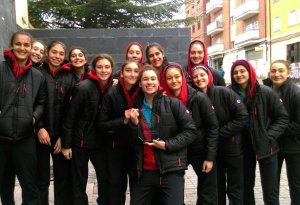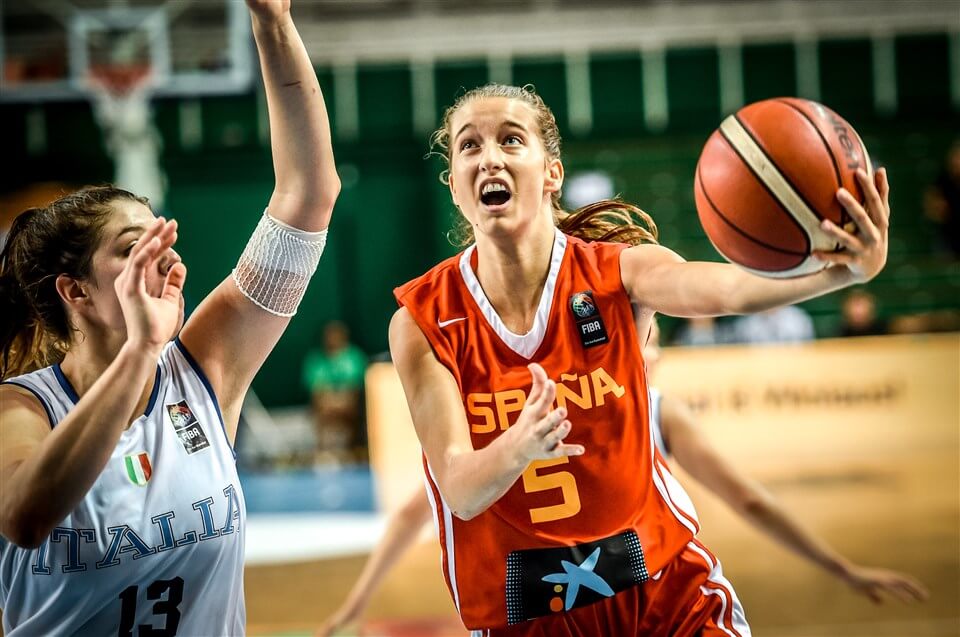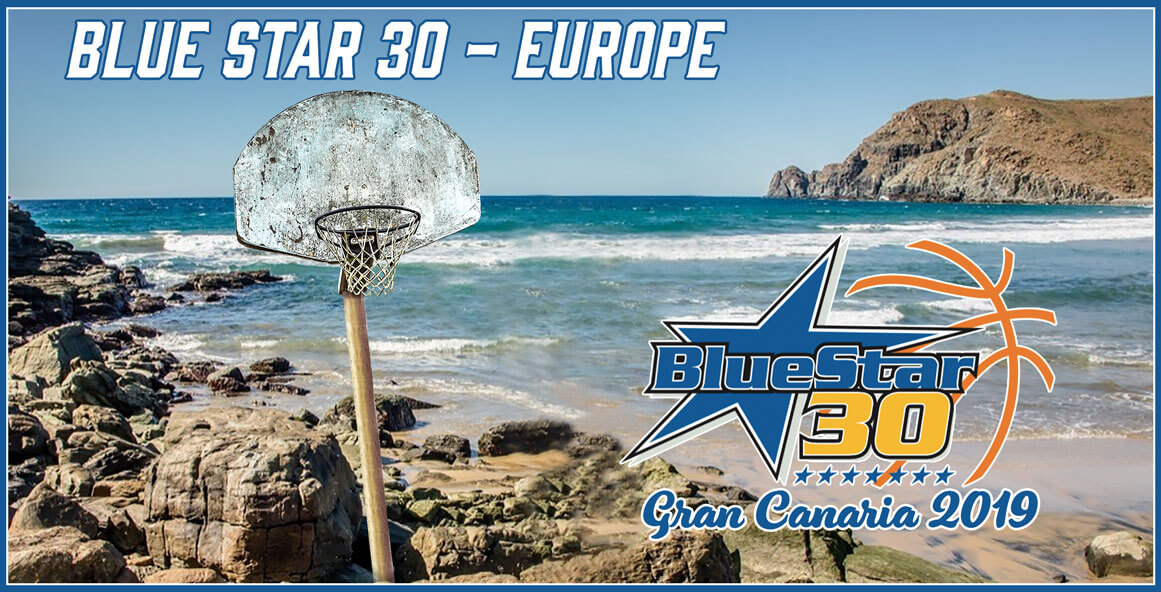(Photo: FIBA) Early December in Zamora, Castilla y Leon, Spain, 150 miles North-West of Madrid, in between two public holidays, took place the 2nd edition of “Memorial Juan de Mena, Torneo Internacional U16F”: a 3 days long U16 international tournament named after the late Juan de Mena, former coach of CD Zamarat (Zamora’s profesional women’s basketball team which compete in Liga Femenina, Spain’s top division) and important women’s basketball figure in Zamora and the state of Castilla y Leon (CYL).
The tournament, just as last year, involved three national teams (Spain, Italy and Turkey) that were joined by the local U16 team: “seleccion U16 de Castilla Y Leon”. The action took place from the 7th til the 9th of December, with 2 games a day for a total of 6 games. Thanks to the public holidays an interesting crowd answered the organizers’ call and filled the stands to watch a new generation discover the international level. Most players involved in the tournament are 2002-born but some 2003 entered the mix too.
.@BlueStarMedia1 never sleeps on the youth game worldwide! We are in Zamora, Spain for an U16 tournament with Spain 🇪🇸, Italy 🇮🇹, Turkey 🇹🇷 and Castilla Leon local team! pic.twitter.com/tMvtxGEqG1
— BlueStar Media (@BlueStarMedia1) December 8, 2017
Except Erdogan (TUR), Natali, Gilli & Spinelli (ITA) and Garcia (ESP) who already played at prior FIBA events, this tournament was for most of the girls not only their first international competition but also for many their first ever NT environment experience. As was to be expected from such a setting, the overall level was irregular but as the tournament progressed the quality of basketball got better. Still coaching staffs will be aware of all the work that lays ahead of them before they’re ready to compete, collectively and individually, at the FIBA Europe U16 Championship next August in Lithuania. Spain from the beginning looked like the better team by far and as expected they won the tournament unbeaten and have never been in danger once. Their technicality and physicality were above. Turkey and Italy arrived with new teams with many unexperienced players in what looks like a transitional period for both nations. Castilla y Leon, with a much shorter roster than the other 3 teams showed quality and pride.
All teams used this tournament to evaluate their players, to get to know them better, to have a better idea of where they stand as a team, as it was pointed by José Ignacio Hernandez (Spain’s U20 Head Coach, former Senior NT Head Coach and Spain’s all women’s national teams supervisor) ahead of the tournament: “For us it is important to start preparing the U16 Euro of next summer. Evaluate players, try different situations, different players’ combinations on the court, etc. As for the Euro itself we will of course do our best to get the best result possible, but I think this group of players can grow a lot and by the time they reach U18 they will be, I think very interesting. For now we grow day-by-day, camp after camp and tournament after tournament. We will see. We have a very young group of players. We will take what comes at this stage but we are more hopeful that this group will really hit its potential at U18 level. ”
On the Italian front, Italy’s Head Coach Giovanni Lucchesi sounded no different: “It is not an easy situation for us, as we are not like for example Spain…our pool of players from which to choose is thinner. Our target here at this tournament is to do a check-up of our players. After this tournament maybe we’ll realize some profiles don’t fit and then decide to make some changes before the Euro. But this tournament is a perfect occasion for us to do so.” In addition to dealing with the emotions involved in any debut and their personal desire to perform well, all players also had the task to integrate, process and execute a large amount of informations/requirements from their federations regarding team identity and style of play. All teams only had a few days prior to the tournament to make progress during their respective camps. During the tournament the players’ effort to match expectations was clear and prevented action from flowing naturally especially during the first 2 days.
Gran trabajo de nuestra selección cadete femenina en el #MemorialJuandeMena #U16F, compitiendo hasta el final contra tres selecciones nacionales de primer nivel. ENHORABUENA!!! pic.twitter.com/znrwXKEHjA
— FBCyL (@FBCyL) December 9, 2017
Even with a shorter roster in numbers, size and quality than the other 3 teams, Castilla Y Leon, who finished 2nd last year beating both Italy and Spain, which underlines even more Spain’s talent pool, competed strongly tough unsuccessfully during its 3 matches, led by a quatuor of interesting players PG Inez Cruz (23mpg-8.67ppg-2.3rpg-1apg-1.7spg-2.3topg) great ball-handling, impressive crossover, good court vision and nice change of pace ; G/SF Andrea Cueva (28.3mpg-12ppg-4.7rpg-3.3spg-3.7topg) high IQ, hoop-driven, scorer ; SF Daniela Lopez (28mpg-9.3ppg-2.7rpg) and G Alejandra Diaz (33mpg-6.3ppg-8.3rpg-1spg-2.3topg). CYL only surrendered due to fatigue and lack of team depth. They understandably lost their opening game to a stronger, deeper and taller ESP team, payed the price of their day 1 effort in their second match-up against ITA on day 2 and did more than resist to TUR during their last game, leading at the end of Q3 and staying close all the way deep into Q4. They finished the tournament at the 4th place, not managing to get a win to their name.
Torneo di Zamora 🇪🇸, la Nazionale #U16🚺 battuta dalla Spagna 70-52 (Natali 23). Azzurre chiudono al terzo posto. @lucgio: "Lottato con orgoglio contro squadra fortissima" 👉https://t.co/OLHAoFHQeJ pic.twitter.com/2VxUnza2pr
— Italbasket (@Italbasket) December 9, 2017
Italy came with a very green group who was missing last year’s FIBA Europe U16 Championship All-Tournament Team member Ilaria Panzera but could count on the amazing efficiency of the tournament’s leading scorer G Giulia Natali (22mpg-18ppg-1.66rpg-2topg-FG2 65%-FG3 50%-FT 60%), the above-average athleticism of SF/PF Essane Lekre (22mpg-4ppg-4rpg) as well as the interesting profiles of SF Francesca Leonardi (21mpg-4ppg-3rpg-1.33apg-1.66spg-1.33topg), G Marta Pellegrini (19mpg-7.3ppg-3.66rpg-1spg-2.33topg), G Martina Spinelli (18mpg-5.6ppg-6.3rpg), SF Caterina Gilli (22mpg-7.33ppg-7rpg-1.33apg-2.33topg) and prospect G Sara Ronchi (15mpg-3.3ppg-2rpg, 2003). Nevertheless it is expected to hear a lot of players’ last names being called by Italy’s head coach during next months’ practices as he famously gives instructions to his players calling them by their last names. Italy really struggled with sometimes simple individual and collective fundamentals during the tournament. Bringing the ball up the court was not an easy task for this group and both their shooting percentage (saved by Natali’s performances) and number of turnovers will have coach Lucchesi be very concerned and aware of the huge amount of work ahead. In an equally difficult first game for both teams with TUR, only a good shooting night by TUR SG & tournament MVP Sude Yilmaz (20pts-4/6FG3) prevented the Italian side from winning. On day 2, though resting Caterina Gilli for most of the game and using Giulia Natali only 13min (15pts), they still benefitted from a deeper roster and fresher players to see off the valiant but tired-looking CYL selection. On the last day they produced their best collective effort against ESP but it was far from enough to finish on the winning side. If you take away Natali’s impact from the team the overall FG% drops from 42.2% to below 30%. On top of this Italy turned the ball over at concerning rate of 21 turnovers per game (not including the numerous infractions that did not get whistled). It was also clear that a lot of physical work needed to be done. The body strength necessary to compete at the international level needs improvement. This lack of physicality unabled Italians to fully control their footwork, their ability to space the floor and to create a good flow. They finished the tournament with a sole victory against CYL and thus finished at the 3rd position.

(TURKEY U16 NT & Sude Yilmaz holding her MVP trophy)
Turkey, just as Italy, brought a whole new group of players to the tournament, missing according to their head coach Halil Demirbilek three key players, and faced the same issues as the Italians. Their physicality is not yet optimal and it creates both individual and collective issues. Turkish players thrive to play a spectacular and high-paced basketball, full of individual feats, shooting prowess and full-court defense. The only thing is that they try to execute actions their capacities do not yet allow them to do. A lot of work combined with the girls’ visible passion for the game should address these issues. Nevertheless promising players were present on their roster as highlighted by the tournament’s MVP SG Sude Yilmaz (22mpg-12.66ppg-3rpg-1.33apg-1.66topg-1.33spg-FG2 50%-FG3 60%-FT 100%) who if left open and on a good night will bring you point in series from the perimeter, though her overall individual fundamentals need improvement, especially her left hand. Starting PG Derin Erdogan (28mpg-10.6ppg-3rpg-4.33apg-2spg-3.33topg) has excellent dribbling skills but she keeps the ball too much and slows the whole team’s offense. Nevertheless she is a solid backcourt player, with a leader mentality, already seen in Bourges last year at Euro U16 2017. SF Hatice Gügelik (22mpg-9ppg-3.33rpg-1.33spg-2.33topg), PF Melek Ulunoglu (22mpg-9.66ppg-7.33rpg) and C Sude Tirjkmen (17.3mpg-2ppg-3.66rpg-1.33topg) all can have an impact in the future, especially Melek Ulunoglu who though still lacks athleticism, can, thanks to her long frame and promising feel for the game, turn into a very interesting modern 3. Turkey won 2 games and only lost to Spain, helping them finish runner-ups as the curtain fell on the tournament.
La #U16F ya tiene FOTOS OFICIALES para el Torneo Juan de Mena‼️#SomosEquipo
📸 Galería Flickr 👌https://t.co/UKpY9AEjhw pic.twitter.com/7SdI2p4rlp
— Baloncesto España (@BaloncestoESP) December 7, 2017
As pointed already, Spain had the deepest and best team of the whole tournament thanks to a very versatile, tall and hard working group. They started the tournament slowly against CYL with the players visibly very focused on producing what was expected from them strategically and collectively. The group grew into the tournament stronger and stronger, displaying very tough defense as well as intelligent ball movement. They took care of the ball much better than other teams finishing with only 13TO per game, compared to the 20-21 averaged by the others. Their intensity and size helped them see off CYL in the 1st game, their strong defense on day 2 prevented TUR from finding easy scoring opportunities, keeping them below 50pts while they scored over 70pt in their other 2 games, finally on the last day they completed their best performance against an improved and better looking ITA. They won all 3 games with an average margin of 22.3pts! A few players stood out for Spain like the electric, very athletic, composed, driving force PG Mama Dembele (19.3mpg-6ppg-3.67rpg-1.67apg-1.67spg-2.67topg), the tall, skilled, high IQ back-up PG Begoña Santiago (21mpg-8.33ppg-2.33rpg-1.67apg-1.67topg), Spain’s newest elite prospect: 2003-6’2 SF Gisela Sanchez (19.5mpg-11ppg-4.5rpg-3.5spg-1topg) a modern long tall mobile SF, the all-round smart, great defender G Cristina Mato (22.3mpg-10ppg-3.33rpg-1.33apg), the promising SF Maria Torres (15.3mpg-6ppg-1.67rpg) as well as the towering presences of both C Paula Fraile (18.4mpg-7ppg-3.67rpg-1.33apg) and C Marta Garcia (18mpg-10ppg-4.33rpg-1spg-1topg), with a special mention to Paula Fraile whose positionning and court vision are excellent.
¡Campeonas! 🏆🏆
1ª 🇪🇸 España
2º 🇹🇷Turquía
3º 🇮🇹 Italia
4º @FBCyL pic.twitter.com/Syhs2scGsr— Baloncesto España (@BaloncestoESP) December 9, 2017
Overall, all federations will be happy of this tournament and will talk home precious lessons learned during these 3 days of competition. Spanish playcaller Isaac Fernandez expressed his opinion once all games had finished and his team had earned the Champion title: “These tournaments for us are really practical. We follow a large group of players. Some we know already from prior events but some are total newcomers, so it’s a good opportunity to be able to check how they are doing and to be able to evaluate their level. At this age things go very fast. Within a 3 months period of time a player can change, either way, very fast. But right now we are very satisfied by how the girls practiced, how the tournament went. We only had 3 days together prior to the beginning of the tournament. 3 days with a huge load of work and an equally huge amount of infos/datas for these 15 years-old girls to process, apprehend and then try to reproduce on the court. This on top of the emotional roller-coaster it is for girls of this age to play internationally for their NT for the 1st time… We brought 13 players from the 2002 generation, + Gisela Sanchez who is a 2003, to this tournament. The U15 team is also here holding a camp as well. We took 13 players but we are following a bigger amount. The U16 NT is very open. Next in January we have the Spanish Championship of Autonomous Communities. We will see how our players perform in a more leading role. We will be able to tell better then who we really want. Then for Easter we will hold another camp prior to going to Le Poinçonnet (France) for France’s annual U16 International Tournament.”
Coach Halil Demirbilek (Turkey) also expressed his opinion upon conclusion of the tournament: “At the Turkish Basketball Federation we are working on a new infrastructure system for our youth program: we started talking with all the clubs in Turkey in order to create a new type of cooperation between them and the NT’s. Thus in all the clubs we are scouting all the best players available. We are also making inter-season camps in order to evaluate their skills and their development. Our main purpose here was to get to know our players: their skills, strengths, development, etc. Our group of players is 24 players big. We brought 14 here. Some are injured. We are missing 3 important players. We are making progress. Our goal is to have a strong defense (fullcourt press, halfcourt press, steals, defensive rebounds) in order to be able to develop a fast type of basketball with many fast-breaks. If we keep working hard and keep the positive aspects seen at this tournament we can make surprises. And overall our goal is to develop players capable to reach the Senior NT.”
While Coach Giovanni Lucchesi (Italy) took time to tell us about the new youth program, called “High School BasketLab” the Italian Federation started this season with the 2003 generation as pioneers: “We started this year in Rome a new program with the 2003 generation. We gathered all the best 2003 players at the “Centro de Preparazione Olimpico” (Olympic Preparation Center) in Rome where they train and go to school. The idea is to have the team compete only at international level and not domestic, in this case in the EYBL (European Youth Bassketball League) which is the youth section of the EEWBL (Eastern European Women’s Basketball League). It should be a good experience. We want our young players to experience international games and to do a lot of fundamentals and skills work when not competing. It is the first time we do this. We did something similar a few years ago with the 1996-1997 generation (Cecilia Zandalasini, Mariza Tagliamento, etc.), only that that generation played together as a club in Italy’s second division: Serie-A2, and not internationally.”
Tournament’s results and final standings:
Day 1 TUR 71 – ITA 66 | ESP 72 – CYL 48
Day 2 ITA 65 – CYL 51 | ESP 74 – TUR 48
Day 3 TUR 73 – CYL 59 | ESP 70 – ITA 52
1/ ESP (3-0)
2/ TUR (2-1)
3/ ITA (1-2)
4/ CYL (0-3)
Team Statistics:
ESP: 72ppg – 61/145FG2-42% – 14/52FG3-27% – 52/86FT-60.5% – 36.7rpg-10.3apg-11spg-13.7topg
TUR: 64ppg – 53/130FG2-40.8% – 20/59FG3-33.9% – 26/46FT-56.5% – 36.3rpg-9apg-9.66spg-19topg
ITA: 61ppg – 59/139FG2-42.4% – 10/43FG3-23% – 35/67FT-52% – 39.33rpg-7.66apg-9.33spg-20.33topg
CYL: 52.7ppg – 44/132FG2-32.6% – 10/36FG3-27.8% – 47/72FT-65.3% – 33.6rpg-5apg-10spg-18topg
Born to Polish PE teachers/coaches parents, involvement with sport and basketball was never a question. Eastern attention to fundamentals, athleticism, discipline and hard work eventually met Western standards through his development in the French system. Now a former player with a passion for the women’s game going back for more than 25 years, he uses his knowledge to bring insights and perspective on women's basketball internationally - with a strong emphasis on Europe and player development.





